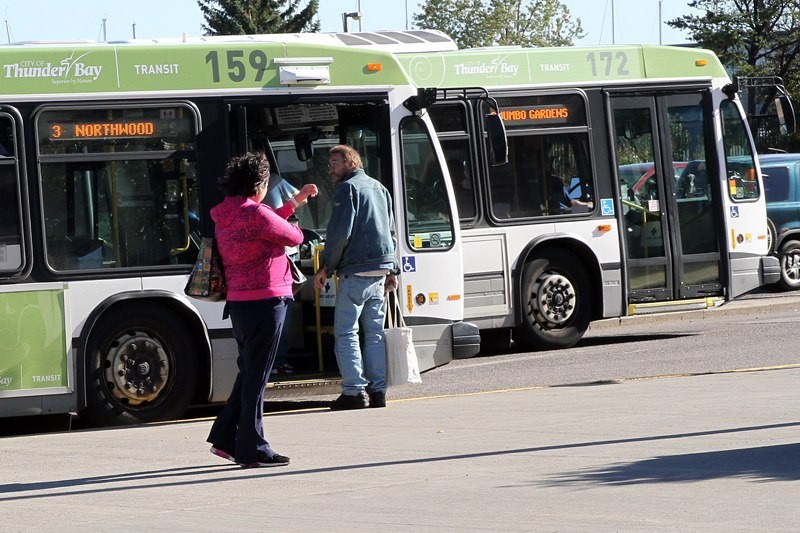THUNDER BAY – The City of Thunder Bay will examine the possibility of offering free public transit, following a request backed by a collection of local organizations.
Advocacy group Poverty Free Thunder Bay presented a proposal to phase out fares over three years to city council Monday night, citing a range of social, environmental, and economic benefits.
The group suggested reducing the city’s $3 bus fare by a dollar a year, making transit free by 2023.
As part of the transition, they also called for free fares on the fourth Friday of every month in 2021, with every Friday fare-free in 2022.
The city collects about $7 million a year in fares and other user fees, though several factors make the actual financial impact of eliminating fares uncertain.
Several councillors expressed support for the idea in principle, but remained skeptical the city could achieve that goal so quickly, or on its own.
Councillors argued the provincial and federal governments should pick up the tab for such a policy, noting no other Canadian city had yet taken the step.
“It’s a great idea,” said Coun. Aldo Ruberto. “In discussions with organizations I’ve been dealing with, this has come up over and over again… but [your proposal] might be too accelerated.”
Ruberto suggested the city could instead sell the idea as a pilot project to upper levels of government, or begin by making transit free for certain groups, such as seniors or children under 12.
Still, council voted unanimously to at least study going fare free, directing city administration to report back on the implications of implementing the Poverty Free plan by early February, in time for consideration for the 2021 budget.
Poverty Free spokespeople Paul Berger, Tracey McKinnon, and Jules Tupker pointed to the results of a survey they conducted to gauge how the city’s elimination of fares due to COVID-19 from March to July impacted residents.
“Respondents noted they had more money for rent, laundry, groceries and prescription drugs, better access to work and medical appointments, and were less stressed about whether they had tickets or exact change for bus fare,” the report noted.
The group argued the move would also reduce local greenhouse gas emissions and bring economic benefits by putting money into the hands of low-income people, who they said are more likely to inject those dollars back into the local economy.
Their recommendations were supported by local organizations including the Thunder Bay Public Library, Roots to Harvest and the Thunder Bay Urban Aboriginal Strategy.
The city would need to add new bus routes and increase frequency of service on existing ones to make the policy effective in luring car commuters onto buses, Berger acknowledged.
That would increase costs beyond the $7 million in lost fares, councillors pointed out.
“To incentivize the behavioural change, you’re likely going to need an enhanced service, which comes with an enhanced cost,” said Mayor Bill Mauro. “So it’s not only the $7 million… It’s a big nugget we’re talking about here.”
Making transit free could also bring in additional revenue, Ruberto said. Because the city’s annual Ontario gas-tax allocation of around $2 million is calculated largely based on transit ridership, making transit free could boost that amount by driving up ridership numbers.
However, Coun. Albert Aiello questioned whether the funding formula would still apply if transit was made free – a question to which city administration did not have an immediate answer.
While saying she supported free public transit, Coun. Shelby Ch’ng was skeptical the city should be on the hook for it.
“I do support the idea of free transit for everyone, however, I’m struggling,” she said. “When council increases taxes, we increase by property value, and not by someone’s ability to pay.”
